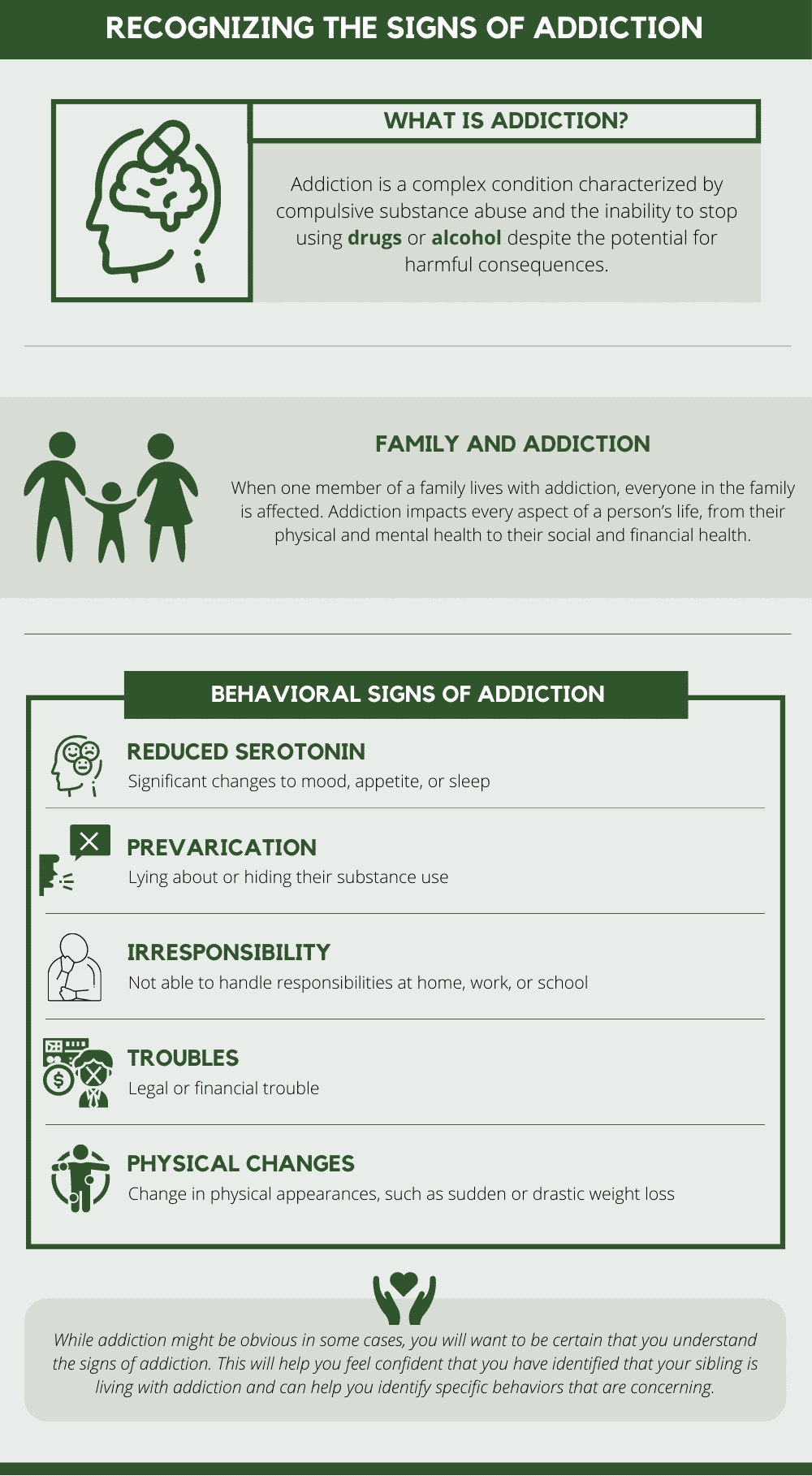When one member of a family lives with addiction, everyone in the family is affected. Addiction impacts every aspect of a person’s life, from their physical and mental health to their social and financial health. It can be very difficult to watch someone you love suffer from the consequences of addiction. The stress, sadness, or frustration can ripple through the entire family and cause significant strain on even the closest of relationships. This is especially true when the addicted person is your sibling. Navigating that relationship and managing the emotions and difficulties that come from their addiction can be especially difficult.
Most people feel compelled to help a loved one who struggles with addiction but may not know where to start. Addiction can be a highly emotional and delicate subject. On the one hand, you want to push your loved one to get addiction treatment. On the other hand, you do not want to push them away from the family. Finding that balance can be tricky.
So, how do you help an addicted sibling? With a little bit of education and preparation, you and your family can be an important part of your sibling’s decision to seek treatment. With the right treatment and the support of your family, your sibling can recover from addiction and learn how to live the healthy, sober life they deserve.

Recognizing the Signs of Addiction
While addiction might be obvious in some cases, you will want to be certain that you understand the signs of addiction. This will help you feel confident that you have identified that your sibling is living with addiction and can help you identify specific behaviors that are concerning. Some common behavioral signs of addiction include:
- Significant changes to mood, appetite, or sleep
- Lying about or hiding their substance use
- Not able to handle responsibilities at home, work, or school
- Legal or financial trouble
- Change in physical appearances, such as sudden or drastic weight loss
Keep these symptoms of addiction in mind and keep track of what you are seeing. When you do eventually offer help, you will want to bring up specific behaviors that concern you.
Sometimes, it is clear that your sibling is struggling with addiction. You may see overt signs of drug use, such as marks or scars on their body. You might witness them using drugs or find drug paraphernalia in your sibling’s belongings. Or, they may tell you about using. In any case, at some point, it will become clear that they are living with addiction. Then, you and your family can take action to get them the help they need to overcome their addiction.

Get The Care You Need and Deserve
Woburn Addiction Treatment is a leader in the addiction treatment field, with proven success in facilitating long-term recovery. Our team of top clinical & medical experts specializes in treating addiction coupled with mental illness, ensuring that each person receives individualized care. Call us – we’re available 24/day, 7 days/week.
How to Have an Intervention That Will Help an Addicted Sibling Get the Help They Need
Having an intervention involves preparing, planning, and learning. An intervention is more likely to be successful if you consider the following:
Decide who will be there: Generally, interventions are held by a small group of close friends and family who are directly impacted by the person’s addiction. It is best to avoid involving people who are struggling with their own addiction.
Choose a time and place: Find a private space where you will have plenty of time to have the intervention without interruption. Try to choose a time when it is unlikely your loved one will be under the influence of drugs or alcohol.
Plan: As a group, learn as much as you can about addiction. Decide the order in which people will speak. Most importantly, look for local treatment centers that offer the addiction treatment programs your loved one will need. Identify the enabling behaviors you will stop immediately and decide how you will all move forward if your loved one declines treatment.
Hold the intervention: Stay focused and calm. Follow the schedule you made during the planning stage. Avoid anger or judgment.
Follow up: Help your loved one get started in treatment or follow through on the consequences you’ve decided on as a group.
Having an intervention can be stressful, but they often prompt someone to see the effects of their addiction and seek treatment. If you do not feel confident about your ability to plan an effective intervention, consider hiring a professional interventionist to help you go through the process.
How to Help an Addicted Sibling
When it becomes obvious that you need to help an addicted sibling, there are several things you must do. First, it is important that you practice good self-care. Addressing your sibling’s addiction will be stressful and may add significant stress to your life. Prepare for this by learning as much as you can about addiction and taking good care of your own mental health. Find support, either in individual or group counseling, and seek support from other loved ones and friends. Next, you must identify and change any of your behaviors that may be enabling your sibling’s addiction. Some common enabling behaviors include:
- Lying to cover up or make excuses for your sibling’s behavior when using drugs or alcohol
- Completing schoolwork or other duties for your sibling
- Calling into work or school to excuse their absences
- Loaning money for rent, groceries, or other daily expenses
- Bailing them out of jail
- Paying legal fees
There is a fine line between helping someone and enabling them to go deeper into their addiction. If you know that you have been engaging in enabling behaviors, it is important that you stop. This can be stressful and can put a strain on your relationship. Your sibling is likely to be upset about this boundary. One of the most important parts of stopping enabling behavior is making sure everyone else stops, too. Preparing for and holding an intervention can bring families together around the common cause of helping your loved one. An intervention is a planned event that focuses on getting someone to accept an offer of addiction treatment. It is usually held by a group of close friends and family who work together to convey the impact the person’s addiction has had on their community.
Find Help for Yourself or a Loved One Today
If you are concerned about how to help an addicted sibling or another loved one, reach out to the staff at Woburn Wellness Addiction Treatment. We offer support for people at any stage of addiction and recovery.
For more information about our programs, give us a call today.


